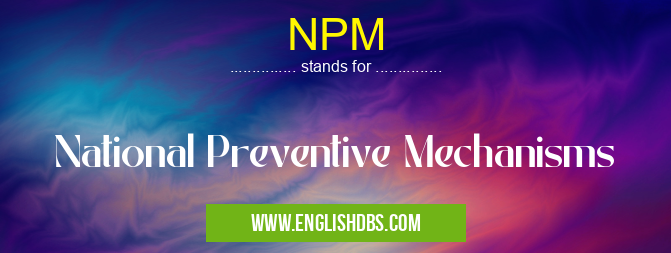What does NPM mean in UNCLASSIFIED
NPM (National Preventive Mechanisms) are independent bodies established to monitor and prevent torture and other cruel, inhuman, or degrading treatment or punishment (CIDTP) in places of detention. They are mandated by the Optional Protocol to the Convention against Torture (OPCAT), which has been ratified by over 90 countries.

NPM meaning in Unclassified in Miscellaneous
NPM mostly used in an acronym Unclassified in Category Miscellaneous that means National Preventive Mechanisms
Shorthand: NPM,
Full Form: National Preventive Mechanisms
For more information of "National Preventive Mechanisms", see the section below.
Functions of NPMs
- Monitor places of detention, including prisons, police stations, and psychiatric institutions.
- Interview detainees and staff, and observe conditions and practices.
- Make recommendations to authorities on improving detention conditions and preventing torture and ill-treatment.
- Report on their findings and make them public.
- Provide training and support to detention staff and other relevant stakeholders.
Structure and Composition
NPMs are typically composed of a diverse group of experts, including lawyers, medical professionals, human rights activists, and representatives of civil society organizations. They are usually independent of the government and have the authority to conduct investigations and make recommendations.
Importance of NPMs
- Prevention of Torture: NPMs play a crucial role in preventing torture and ill-treatment by monitoring detention facilities and identifying potential risks.
- Protection of Detainees: They ensure that detainees are treated with dignity and respect and that their rights are protected.
- Accountability: NPMs provide an independent mechanism for holding authorities accountable for any human rights violations that occur in places of detention.
- Public Awareness: They raise awareness about torture and ill-treatment and promote the importance of human rights in detention facilities.
Essential Questions and Answers on National Preventive Mechanisms in "MISCELLANEOUS»UNFILED"
What are National Preventive Mechanisms (NPMs)?
NPMs are independent bodies established under the Optional Protocol to the Convention against Torture and Other Cruel, Inhuman or Degrading Treatment or Punishment (OPCAT). They are tasked with monitoring and preventing torture and other forms of ill-treatment in places of detention.
What is the role of NPMs?
NPMs play a crucial role in safeguarding the rights of detainees by:
- Conducting regular visits to places of detention
- Interviewing detainees in private
- Inspecting facilities and conditions
- Advising authorities on measures to prevent torture and ill-treatment
Who appoints NPM members?
NPM members are appointed by a national authority, usually with the involvement of civil society organizations. They must be independent, competent, and respected individuals with experience in human rights, law enforcement, or related fields.
How can I contact my NPM?
Contact information for NPMs is typically available on national government websites or through international organizations such as the UN Subcommittee on Prevention of Torture.
Can I file a complaint with an NPM?
In most cases, individuals can file complaints of torture or ill-treatment with NPMs. NPMs investigate complaints, interview witnesses, and make recommendations to authorities.
Are NPMs effective in preventing torture?
Research has shown that NPMs can be effective in reducing the prevalence of torture and improving conditions in places of detention. Their independent oversight and monitoring role helps to deter ill-treatment and protect the rights of detainees.
Why is it important to support NPMs?
Supporting NPMs is crucial because they play a vital role in:
- Protecting human rights
- Ensuring accountability for abuses
- Strengthening the rule of law
- Promoting a culture of respect for human dignity
Final Words: NPMs are essential mechanisms for preventing torture and protecting the rights of detainees. By monitoring detention facilities, interviewing detainees, and making recommendations, they play a vital role in ensuring that places of detention are safe and that detainees are treated with dignity and respect.
